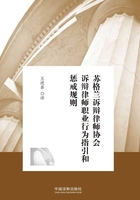
6.3 In Court
6.3.1 When conducting a case in Court, an Advocate should base his questions upon his instructions, the precognitions and the productions supplemented by information obtained at consultation, and on any evidence which has already been led.
6.3.2 An Advocate should not state his personal opinion on matters of fact.It is particularly important to observe this rule when addressing a jury.Counsel must not attempt to supplement the evidence by making observations on matters of fact which are not based on, or justified by, the evidence.In a criminal trial, he should not under any circumstances express either directly or indirectly a personal belief in the innocence or guilt of an accused or any of the accused.
6.3.3 An Advocate may not be a party to the giving of evidence which he knows to be perjured evidence, or to any other course that would enable a case to be put forward on behalf of a client which the client or his solicitor has informed him is unfounded in fact.
6.3.4 An Advocate may not put to a witness any question suggesting that the witness has been guilty of a crime, fraud or other illegal or improper conduct unless he has personally satisfied himself that there is evidence to support the suggestion.
6.3.5 Confessions to Counsel by accused persons.
It follows from the rules stated in paragraphs 5.2.4 and 6.2(b)that, where an accused person has admitted that he committed the act with which he is charged(whether or not that admission is an explicit admission of guilt in law), an Advocate may not conduct the defence on a basis inconsistent with that admission.Thus, he may not put to a witness any question suggesting, or tending to suggest, that the accused did not commit the act. A fortiori, he may not seek to set up a special defence of alibi or incrimination.
6.3.6 Subject to the rule stated in the previous paragraph, Counsel may:
(a)take proper objection to the jurisdiction of the Court, to the competency or relevancy of the indictment or complaint, or to the admissibility of evidence;
(b)test the evidence for the prosecution by cross-examination;
(c)cross-examine or lead evidence in support of a special defence of insanity or(depending on the tenor of the accused’s admission)self defence;
(d)cross-examine or lead evidence for the purpose of explaining the actings of the accused or supporting a plea in mitigation; and
(e)make submissions as to the sufficiency in law of the evidence to support a verdict of guilty.
6.3.7 Exparte statements of fact by Counsel at the Bar
The Court frequently must rely on statements as to matters of fact made by Counsel at the Bar-for example, in the Motion Roll and certain types of Petition procedure.Such statements are made on the responsibility of Counsel as the holder of a public office and a Member of the College of Justice.Counsel must therefore be scrupulously careful to ensure that anything stated as fact is justified by the information in his possession.If the Court asks a question which Counsel cannot answer on the information in his possession, he must say that he cannot answer it and, if necessary, ask leave to take instructions on the matter.This rule applies whether or not the opposing party is represented in Court.
6.3.8 Pleadings
An Advocate must have a proper basis for stating a fact in any pleadings.
6.3.9 Interviewing witnesses
6.3.9.1 There is no general rule that an advocate may not discuss the case with a potential witness, but an advocate, when instructed by a solicitor, is entitled to insist that he accepts instructions on the basis that he, the advocate, will not do so.
6.3.9.2 Once a proof or trial has begun, an advocate must not interview any potential witness in relation to what has been said in court in the absence of that witness.
6.3.9.3 Under no circumstances should Counsel do or say anything which suggests to a witness that he should give evidence other than in accordance with the honest recollection or opinion of the witness.An advocate must avoid doing or saying anything which could have the effect of, or could be construed as, inducing the client or a skilled witness to“tailor” his evidence to suit the case.
6.3.9.4 Some cases cannot be properly prepared or conducted if the rule stated in para.6.3.9.2 is followed strictly according to the letter.The client may be accompanied by a relative or friend who is also a potential witness.Where the client is a corporate persona, those who can speak for the corporation may also be potential witnesses, although in that case it is usually better to discuss the case with someone who is not personally involved and can take a more objective view of it.Some witnesses may be witnesses to fact as to part of their evidence and expert witnesses giving opinion evidence as to another part.It may be essential in a case raising technical issues to discuss points arising from the evidence with a skilled witness who has not yet given evidence.In such cases, an Advocate must use his discretion.But he should always act according to the spirit of the rule-namely, that Counsel should not under any circumstances do or say anything which might suggest to the witness that he should give evidence otherwise than in accordance with his honest recollection or opinion.
6.3.9.5 An Advocate may not, except with the consent of his opponent or of the Court, communicate with any witness, including his client, once that witness has begun to give evidence until that evidence is concluded.
6.3.9.6 As to interviewing the client or witnesses in the absence of the instructing agent, see paragraphs 4.5 and 4.6 above.